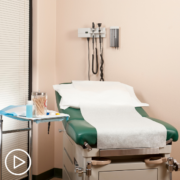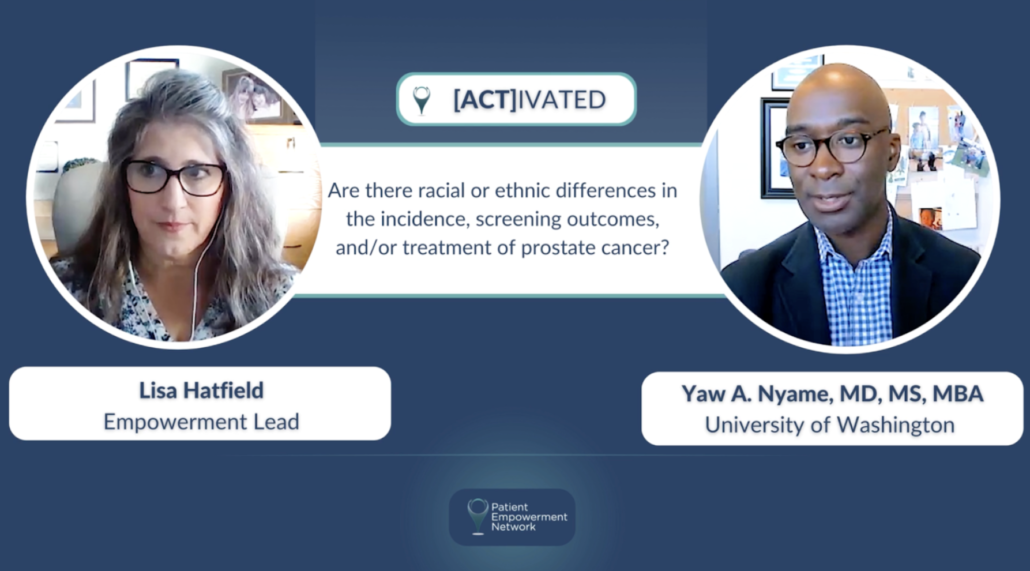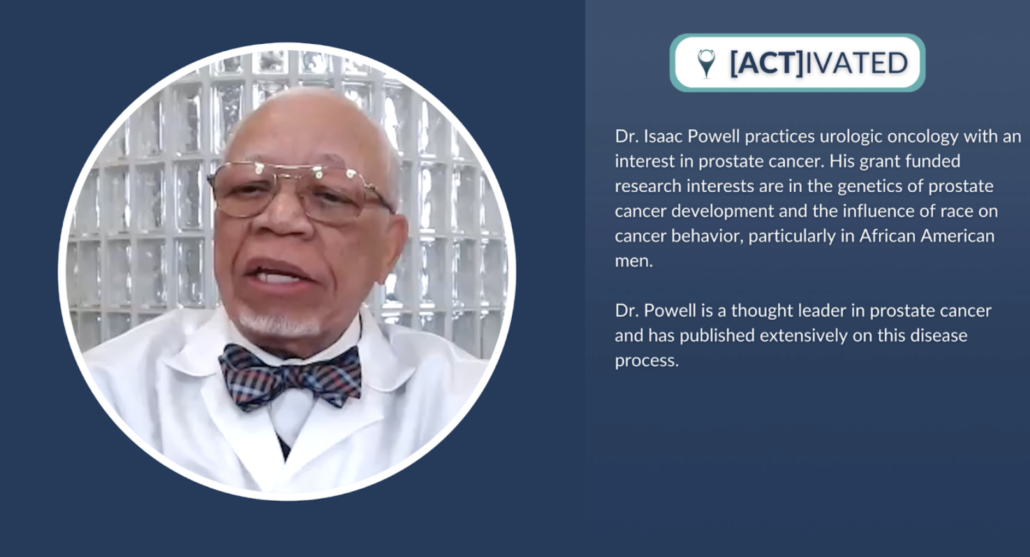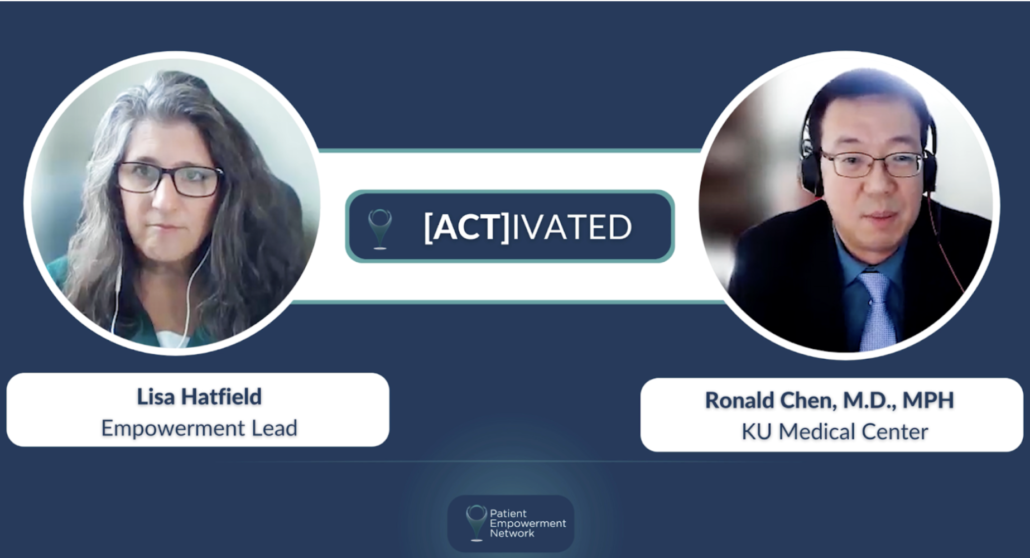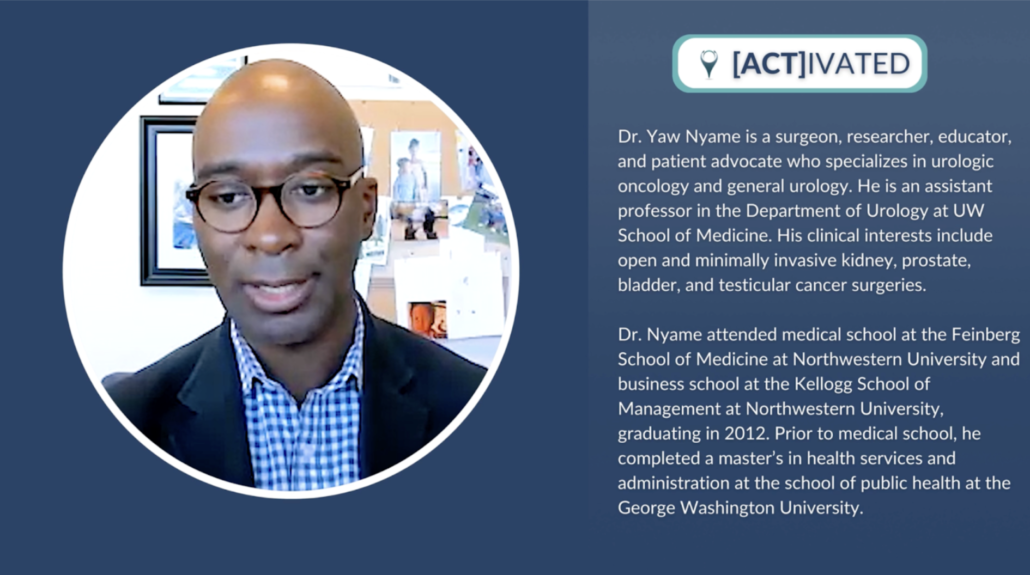How Can Prostate Cancer Screening Access Be Increased?
How Can Prostate Cancer Screening Access Be Increased? from Patient Empowerment Network on Vimeo.
How can access to prostate cancer screening be improved? Expert Dr. Ronald Chen from KU Medical Center discusses the importance of prostate cancer screening, methods that experts are using to increase awareness, and patient advice for optimizing health outcomes.
[ACTI]IVATION TIP
“…if you’re diagnosed with advanced prostate cancer, always consider if a second opinion is right for you, a second opinion with a specialist who may have access to the latest treatments, technologies and clinical trials, and having that information before you to make a treatment decision can provide you with information, so you can make the best decision and have the best outcome for your cancer.”
Download Prostate Cancer Screening Tips Guide
See More from [ACT]IVATED Prostate Cancer
Related Resources:
Transcript:
Lisa Hatfield:
Are there any innovative approaches or technologies that you and your team are exploring to improve prostate cancer detection, treatment, or support services, especially for communities with limited access to healthcare resources?
Dr. Ronald Chen:
I think that access to screening is so important because screening, to be able to catch a cancer as early as possible allows the highest chance for cure and the best outcome for the patient. So what my team has been doing to try to increase access to screening is two-fold.
One is, we need to increase the awareness that screening is important. And unfortunately, in prostate cancer, there’s actually some controversy about whether prostate cancer screening is good or bad for the patient. There’s been some, I think, unfortunate national guidelines that recommend against screening and a lot of debate about whether screening is good or bad. I think it’s been unfortunate. It actually has led to some physicians and patients to really be doubtful about prostate cancer screening. I think we need to do a lot of education to actually reverse that misperception. And so one aspect is to educate, to make sure people do understand that prostate cancer screening, early detection is important.
So part of what my team is doing, not only really screening, but also all of prostate cancer and actually other cancers as well, is that my cancer center is doing a regular podcast. And so, what my cancer center director, Dr. Roy Jensen, on a weekly basis will interview a cancer expert and have a conversation about some cancer topic. It could be screening, it could be how to live a healthy lifestyle as a cancer patient, it could be about survivorship, it could be about a new technology to diagnose or treat cancer, a topic, a different topic every time recorded as a podcast with experts at my center and other places, and that podcast is freely available to anybody who wants to learn about different topics.
And I think that’s really great because I think knowledge gives patients power to make the right decisions. And so, our podcast, and actually we have some videos as well freely available through Facebook and other media channels, is one way to help us tackle this issue, and increase knowledge.
I think the other aspect of increasing screening is to have more opportunities for screening. And so, what my cancer center has been doing is we actually host three cancer screening events around our state, around Kansas, around Western Missouri, which is close to where we are, and we would just host screening events. It’s prostate cancer, it’s skin cancer, it’s lung cancer, it’s a colorectal cancer. The more we’re able to offer these free community events where people can come and just get cancer screened, the more access we provide and the more early detection we have for patients. I think those are pretty innovative strategies, free education, podcasts, and videos that anybody can access, hosting community events for screening. Sometimes we have it at local churches, sometimes we just have local hospitals to bring this to where people are. I think it’s pretty innovative, I think we make an impact there.
I think another really important thing is telehealth. I think patients from almost anywhere in the country, even if they live in rural areas, can have access to cancer experts and can have access to clinical trials because of telehealth. Telehealth, which is basically a consultation with a cancer specialist, either through phone or through video like Zoom, has really increased the access patients have anywhere to expert opinion, so they can make the right decision for their treatment and potentially have access to clinical trials. I think that’s really made a huge difference for patients as well.
And so, my activation tip for this question is, if you’re diagnosed with advanced prostate cancer, always consider if a second opinion is right for you, a second opinion with a specialist who may have access to the latest treatments, technologies, and clinical trials, and having that information before you to make a treatment decision can provide you with information, so you can make the best decision and have the best outcome for your cancer.


